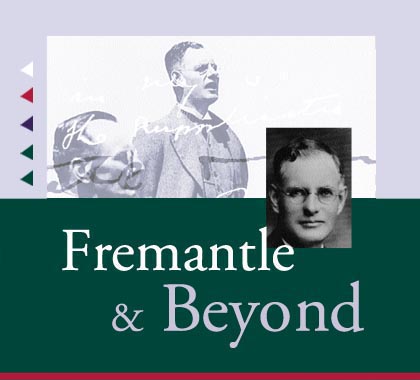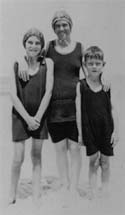
Curtin's political career began in earnest when he won the federal Fremantle seat in 1928 from smallgoods retailer and manufacturer, William Watson.
The seat was established in 1901 when Australia became a Federation and the area covered by his constituents at that time stretched from Fremantle to Victoria Park.
Curtin was a seasoned campaigner. His first taste of electioneering was in 1914 when, at the urging of his Socialist friends, he contested the Victorian seat of Balaclava. It was never expected that he would win from stalwart incumbent W. A. Watt, however, Curtin did well enough to reduce Watt's expected majority. Then in 1919, shortly after his arrival in Western Australia, Curtin was persuaded to contest the seat of Perth as the endorsed ALP candidate.

Elsie Curtin and children at the
beach.
JCPML. Records of the Curtin Family. Elsie Curtin with
Elsie and John at Cottesloe Beach,
1930. JCPML00004/15
However, having to cope with the deaths of both his father and his best mate, Frank Hyett, that year, his heart was not in the election and he was soundly defeated. But Curtin was coming to the conclusion that parliamentary action was the only realistic means to obtain Labor's objectives for the workers, and he put himself forward as a candidate for the seat of Fremantle during the 1925 elections. He was beaten by Independent William Watson and had to wait until 1928 to turn the tables.
Sworn in as part of the Eleventh Parliament of the Commonwealth of Australia, Curtin made his maiden speech on February 14, 1929 in the impressive new Parliament House (officially opened by the Duke of York in May 1927)-"What is the test to be applied in framing the laws of the Commonwealth? Primarily the law should apply to all citizens of the community. That is an elementary principle of sound government."

More than 20,000 people attended Curtin's
funeral
at Karrakatta Cemetry on July 8, 1945
JCPML. Records of Margaret Stiles. Crowd at
John Curtin's funeral, 1945. JCPML00041/1.
Curtin's political dreams of making a useful contribution to Labor were dashed when he was excluded from a position in Cabinet.
His frustration over his impotence to influence decision-making and the loneliness of separation from his adopted home and beloved family-on a slow boat to Canberra or a long train ride across the Nullabor, the distance between east and west was measured in days, not hours-led Curtin back to drinking. "Lend us a fiver so Frank Anstey and I can go on the scoot."
It was also the beginning of the Great Depression and the Scullin Labor Government, hamstrung by a hostile Senate, was faced with economic disaster. When Labor was defeated in the next election, Curtin also lost his seat and returned to a three-year hiatus in the west.
Depressed by defeat, he toyed with the idea of returning to the east, but in the end western warmth revived his spirit and he settled back into the joys of family life, turning political defeat into personal success. When he regained the seat of Fremantle in 1934, warding off a spirited bid by conservative candidate Florence Cardell-Oliver, he faced the challenges with renewed strength and determination. Within a year he was elected leader of the Labor Party. According to the Melbourne Age, it was "one of the greatest surprises in federal political circles."
Since Curtin's 1934 election win, the seat of Fremantle has staunchly supported the Labor Party. Curtin is the only West Australian MP to hold the position of prime minister and as a lasting legacy his name has been given to streets, places and educational institutions; paintings, photos and busts of Curtin can be found from Cottesloe to Creswick; and the people who knew him still speak of his dedication, humility and goodness. "The preservation of Australia from invasion will be his immemorial monument," said General Douglas MacArthur.

John
Curtin's body is returned to the west for burial.
JCPML. Records of an anonymous
person. John Curtin's coffin being unloaded from the DC-3,
1945. JCPML00177/2
![]()


This website is © John Curtin Prime Ministerial Library, 2006. Except for images from third parties, content on this site is licensed under a Creative Commons Attribution 4.0 International License.